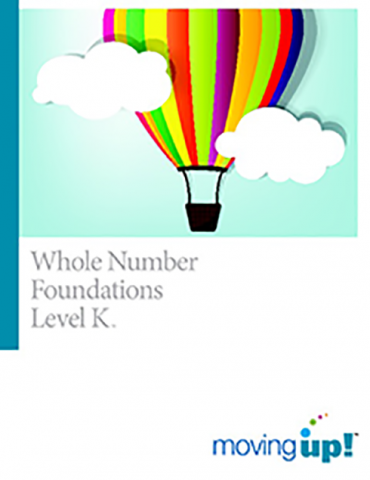Whole Number Foundations Level K

Whole Number Foundations Level K™ is a Tier 2, small-group intervention designed to accelerate the mathematics achievement of kindergarten students who face difficulties developing proficiency with whole number concepts and skills.
- K
- Intervention
Whole Number Foundations Level K (WNF-K) is designed to accelerate the mathematics achievement of kindergarten students who are at risk for mathematics difficulties by focusing primarily on early number sense, numbers and operations, and vocabulary. The primary aim of WNF-K is mastery of number concepts and skills through the number 20.
- Tier 2 small-group intervention provided in addition to core (Tier 1) instruction
- 50 lessons delivered three to five times per week in 20-minute sessions
- Instructional objectives aligned with the Common Core State Standards in mathematics for kindergarten
- Research suggests WNF-K has a beneficial impact on student math achievement.
- The National Center on Intensive Intervention rated a study about the effectiveness of WNF-K as having “partially convincing evidence” regarding the study design, and “convincing evidence” regarding participants, fidelity of implementation, and broad math outcome measures.
- Available in Spanish as Fundamentos de los Números Enteros: Nivel K
Conceptual Framework
- Conceptual Understanding is developed through engagement with mathematical models including number lines, “nifty fifty” chart, ten frames, finger models, tally marks, and objects.
- Procedural fluency and automaticity
- Systematic practice and review within and across lessons, with frequent opportunities for students to respond
- Checks for mastery at the end of each activity
- Math Practice worksheets help teachers monitor students’ mastery of concepts and skills
- Vocabulary and discourse
- Key vocabulary is identified and explicitly taught and reviewed.
- Scripted lessons ensure continuity and precise definitions.
- Students are provided opportunities to use mathematical vocabulary to reason and provide justification.
Instructional Design Components
- Explicit scripted lessons. Lessons explicitly introduce important whole number concepts and skills concisely and consistently, emphasizing important math vocabulary. Lessons also provide frequent opportunities for students to respond, and scripted guidelines allow teachers to address potential misconceptions and reinforce mathematical language and vocabulary.
- Home-school connection. Each lesson includes a “note home” which summarizes the lesson’s concepts and skills, and provides suggestions to practice the math content at home.
- Math Check Points. Individually administered progress monitoring assessments that are administered every 5th lesson through lesson 25, and at lessons 34, 42, and 50.
Materials are available in two different formats:
- Convenient, downloadable PDF format. Once the PDFs are purchased, copies may be made according to the Distribution License Agreement.
- Pre-printed by the University of Oregon Printing Services Department.
Sample Lessons
Whole Number Foundations Level K includes 50 lessons divided into two Teacher Books, Math Practice worksheets, Program Support Materials, and a manipulative list.
- Teacher Book 1: Teacher’s Guide and Lessons 1 – 25
- Teacher Book 2: Lessons 26 – 50
- Math Practice worksheets
- One Math Practice worksheet for each lesson
- Math Check Point worksheets for assessing student progress after every 5th lesson through lesson 25, and at lessons 34, 42, and 50
- Math Check Point data sheets for recording student progress
- One set of worksheets required for each participating student
- Program Support Materials
- Reproducible masters of number cards, place value mats, ten-frames, and a number chart
- Not sold separately
- Manipulative list: Manipulatives are required for implementation of the program and are NOT included. These manipulatives are commonly available in kindergarten classrooms, or may be purchased from educational retailers.
These products can be purchased together as an Intervention Kit. Additional and/or replacement Teacher Books and Math Practice worksheets may also be purchased separately.
Our Research to Your Classroom
Whole Number Foundations Level K was developed and evaluated with funding from the US Department of Education’s Institute of Education Sciences (IES). An initial study involved nearly 300 at-risk students in 29 kindergarten classrooms from four Oregon school districts. Students eligible for the study were randomly assigned to the WNF-K condition or a control condition (standard district mathematics instruction). In general, results suggested that WNF-K students made greater gains on important math outcomes than their peers in the control condition. Specifically, findings revealed small to medium effect sizes favoring WNF-K for the Test of Early Mathematics Ability 3rd Edition (Hedges’ g = 0.37, p = .037) and Early Numeracy-Curriculum Based Measurement total score (g = 0.30, p = .187). Based on the What Works Clearinghouse standards (WWC, 2013) these results would describe WNF-K as having a “statistically significant positive effect” on student math outcomes.
This study was reviewed by the National Center on Intensive Intervention (NCII) which rated it as having “partially convincing evidence” regarding the study design, and “convincing evidence” regarding participants, fidelity of implementation, and broad math outcome measures.
Clarke, B., Doabler, C. T., Smolkowski, K., Baker, S. K., Fien, H., & Strand Cary, M. (2014). Examining the efficacy of a tier 2 kindergarten mathematics intervention. Journal of Learning Disabilities, Advanced online publication. doi: 10.1177/0022219414538514
This list does not constitute an endorsement of any of the trainers nor are CTL Marketplace licensees required to work with anyone on the list. CTL Marketplace licensees may work with any trainer of their choice. Our list is made available solely as a convenience and service to the public. Individuals with professional credentials who would like to be listed as trainers can contact us at ctl@uoregon.edu. Trainers listed below provided their own biographies and contact information.